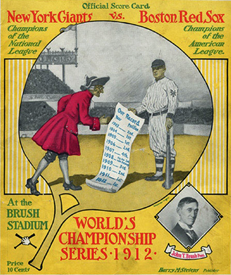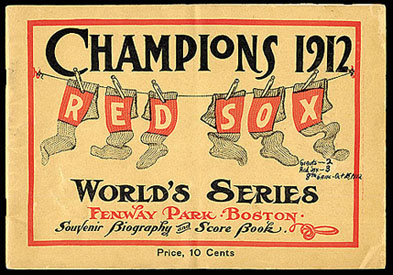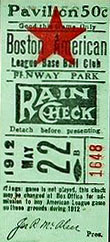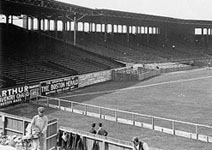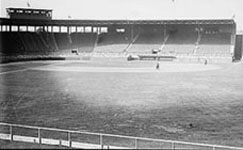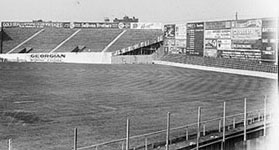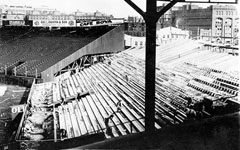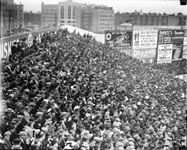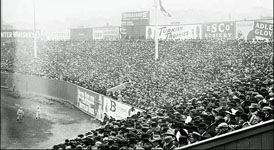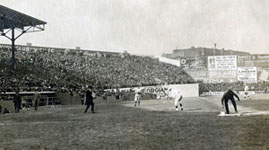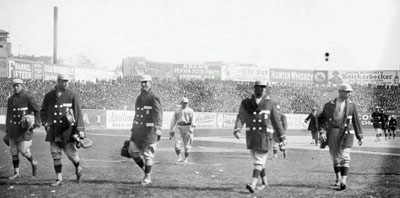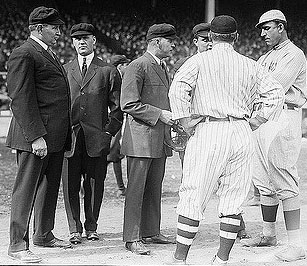1912 - Game 8: New York Giants @ Boston Red Sox
Pennant Races
The defending champion New York Giants claimed first place May 21 and never relinquished it the rest of the season. John "Don't Call Me Mugsy" McGraw's club finished 10 games ahead of the Pirates.
- Southpaw Rube Marquard led the Giants with 26 victories, including a 19-game winning streak to start the season, which is still a major league record. 31-year-old Christy Mathewson added 23 more.
- Rookie spitballer Jeff Tesreau led the NL with a 1.96 ERA while compiling a 17-7 record.
- In addition to handling pitchers superbly, C Chief Meyers led New York with a .358 BA. RF Red Murray led in RBIs with 92 while 1B Fred Merkle topped NY in round trippers with 11.
In the inaugural year of Fenway Park, the Red Sox took a little longer to reach the top, June 10, but once they seized the lead, they didn't relinquish it either.
- RHP Smoky Joe Wood had an incredible year: 34 wins, 5 losses, 1.91 ERA
- The Red Sox had a rookie sensation of their own, Hugh Bedient, who won 20 games as did Buck O'Brien.
- Boston boasted the finest defensive outfield in baseball, one that many argue is the best ever:
LF Duffy Lewis (.284, 109 RBI)
CF Tris Speaker (.383, 90 RBI, 136 R, 10 HR)
RF Harry Hooper (.242, 53 RBI)
- Player-manager Jake Stahl played 1B and hit .301.
These were clearly the best two clubs in baseball.
- Over the players' opposition, the three-man National Commission that ran baseball decreed that Series games would alternate between the cities, starting in New York.
The Commission consisted of American League President Ban Johnson, National League President Thomas Lynch, and Cincinnati Reds owner August Herrmann, the chairman.
The players disliked the alternating sites schedule, which had begun in 1911, because of the grueling daily travel.
- If a Game 7 were necessary, a coin flip would be held to decide that venue.
- Those who expected a close, hard-fought Series would not be disappointed. In fact, because of a tie game called by darkness, the teams would need eight games to determine the champion.
In Game One at the Polo Grounds, the Giants came out in their new violet-trimmed uniforms. McGraw had chosen them because of his fondness for the colors of New York University's athletic teams.
Series Results
- Game 1: Tuesday, October 8 @ New York: Red Sox 4 Giants 3
WP: Joe Wood; LP: Jeff Tesreau
- Game 2: Wednesday, October 9 @ Boston: Red Sox 6 Giants 6 (11 innings - called because of darkness)
Starting pitchers: Giants - Christy Mathewson, Red Sox - Ray Collins
- Game 3: Thursday, October 10 @ Boston: Giants 2 Red Sox 1
WP:
Rube Marquard; LP: Buck O'Brien
- Game 4: Friday, October 11 @ New York: Red Sox 3 Giants 1
WP: Wood; LP: Tesreau
- Game 5: Saturday, October 12 @ Boston: Red Sox 2 Giants 1
WP: Hugh Bedient; LP: Mathewson
- Game 6: Monday, October 14 @ New York: Giants 5 Red Sox 2
WP: Marquard; LP: O'Brien
- Game 7: Tuesday, October 15 @ Boston: Giants 11 Red Sox 4
WP: Tesreau; LP: Wood
With a commanding three-games-to-one lead after five games - Game 2 having ended in a tie due to darkness, the Red Sox lost twice amid lots of behind-the-scenes drama.
- Everyone expected Stahl to start his ace, Wood, in Game 6 to wrap up the series. A day off Sunday because of "blue laws" in both cities prohibiting games on the Sabbath gave Smoky an extra day's rest after his dominating performance in Game 4 on Friday.
As the jubilant Red Sox left the field following their third victory in the Series, they were yelling, That was it! The players assumed Wood would pitch Game 6 and nail down the championship. After all, he had won his first two starts in the Series. On the train to New York, writers observed Boston players calculating their winner's shares which, for many, would be greater than their season salary.
- But owner McAleer visited his manager in the New York hotel the night before the game and "persuaded" Stahl to start Buck O'Brien. Jimmy gave several reasons for the move.
--O'Brien would get a chance for revenge after losing Game 3 2-1 to Marquard, the Giants' starter in Game 6.
--Wood would benefit from a third day's rest.
But the real reason behind the proposal was to get another game at Fenway Park with all the revenue that would bring - none of which would be shared with the players, who benefitted from just the first four games of the Series.
- Probably knowing exactly what his owner was up to, Stahl pushed back, pointing out that Wood hadn't complained about a tired arm or asked for an extra day of rest. Unmoved, McAleer insisted he was the boss.
- If O'Brien pitched like he did in Game 3, the Red Sox still had a chance to wrap up the Series. But, the hurler, assuming Wood would start Game 6, stayed out late the night before getting drunk. The result was predictable. The New Yorkers jumped on him for six hits and five runs in the 1st. Ray Collins pitched shutout ball for seven innings, but it was too little too late as the Giants prevailed 5-2.
- On the train ride back to Boston, Joe Wood's brother, who had lost $100 on the game, sought out O'Brien and blackened one of his eyes in a fistfight.
The dissension on the team carried over to Game 7.
- Before Game 7, Smoky Joe verbally abused O'Brien in the runway from the clubhouse to the dugout, then assaulted him with a baseball bat before teammates pulled the two men apart. Rumor had it that Wood accused O'Brien of throwing Game 6.
- Joe was in no mood to bear down and defeat the Giants, especially since the Red Sox could afford a loss with a one-game lead. "In the cold wind, after a fight, and with a sore arm" and disgusted that he hadn't been chosen to pitch the day before, Wood just lobbed the ball to the hitters in a clear case of cutting the ball over the heart of the plate (as Boston Globe reporter Tim Murnane described it). The result was similar to what happened the day before. After two singles put runners on 1st and 2nd, Wood wound up while pitching to the next batter, allowing the runners to steal 2nd and 3rd easily. By the end of the 1st inning, the Giants had banged out seven hits on only 13 pitches and scored six runs. A good portion of the 32,694 fans had left the premises in disgust. Knowing that Smoky was angered when O'Brien started instead of him in Game Six, manager Stahl couldn't help but wonder if Wood had performed half-heartedly to protest against the Game 6 snub. In any event, the manager pulled Smoky after the 1st. New York romped 11-4 to tie the series.
The only bright moment for Boston occurred in the 9th when Speaker grabbed a drive by Art Fletcher and raced in to touch 2B before C Art Wilson could get back to the bag. It remains the only unassisted DP by an outfielder in World Series history.
Called "Smoky" because of his blazing fastball, the Red Sox ace lobbed meatballs to the plate.
In the clubhouse after the thumping, Wood insisted: I had all my usual stuff, but perhaps I was too confident. Those Giants batters just stood up there and banged away at a fast one, the curve, and my slow one. I will be back in there (in Game 8) if the manager says the word. There is nothing the matter with my arm.
Glenn Stout and Richard A. Johnson wrote in their 2004 book Red Sox Century: While Wood's arm may well have been sore and stiffened because of the pre-game delay, it is equally true that, given the events of the previous day, neither Wood nor many of his teammates may have much cared what happened in game seven. ... It is not inconceivable to believe that the Red Sox, already upset with management, threw the game in order to recoup their losses by laying money on the Giants in game seven at favorable odds. In the days that followed, Boston newspapers intimated precisely that, and Sox fans learned a valuable lesson: when it comes to the Olde Towne team, there is no such thing as a "sure thing."
Games 6 and 7 fractured the truce between the two factions within the Red Sox team that the pennant race and World Series had forged.
- The Protestants or "Masons," led by Tris Speaker, a Texas Baptist, had problems with the hard-drinking Irish Catholics, the "KCs" or "knights" for "Knights of Columbus" (the Catholic counterpart to the Masons), led by C Bill Carrigan.
- Wood, one of Speaker's pals, had blasted O'Brien for his pathetic performance in Game 6. Then Not-So-Smoky Joe's charade in Game 7 provoked the rage of the Irish.
Game 8: Wednesday, October 16 @ Boston
- The Red Sox won the coin flip to obtain the home field for the final game. So the teams stayed in Boston.
- Many observers expected Stahl to return Wood to the hill for the deciding game. But the Bosox skipper told reporters after Game 7, I haven't decided whether to start Bedient or Wood tomorrow ...
- McGraw didn't hesitate to come back with Mathewson on two days rest. Christy hadn't pitched particularly well in Game Two, the 6-6 tie, surrendering 10 hits and 6 runs, although only 2 were earned. He rebounded with a fine performance in Game 5. He gave up no earned runs but lost 2-1.
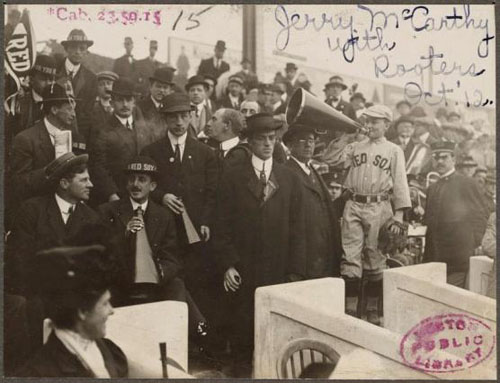
Red Sox Royal Rooters Something that happened before Game Seven at Fenway resulted in a much reduced crowd for Game Eight - just 17,000.
- The Red Sox had a unique cheering section known as the Royal Rooters going back to the previous century.
- The leader of the well-organized 300-man club was Michael T. "Nuf Ced" McGreevy, who owned a saloon called "3rd Base." The mayor of Boston, John "Honey Fitz" Fitzgerald (grandfather of president John Fitzgerald Kennedy) served as chairman for awhile.
- The club reserved seats for the Rooters in the LF bleachers so that the gang could intimidate or distract the opposition.
- The Rooters led over a thousand Red Sox fans to New York for Game One at the Polo Grounds. Arriving in four trains, they staged a torchlight parade down Broadway. They sang their favorite songs "Tessie" and "When I Get You Alone Tonight" to the accompaniment of their own brass band. They dispersed an estimated $100,000 in bets. The next day, the Giants, happy to have the added revenue, allowed them to do a snake dance and cakewalk to their special seats in the Polo Grounds. Mayor Fitzgerald greeted the Red Sox as they entered the field.
- The Red Sox enjoyed the Rooters support at both venues until the club got greedy. Because of the tie game, Game Seven became an extra game for which the Royal Rooters had not reserved tickets. So when Nuf Ced and Company arrived at the park, they found that most of their seats had been sold to rich, new Johnny-come-lately VIP fans.
- The enraged Rooters stormed the field, delaying the game (and contributing to Wood's poor performance by disturbing his warmup) until mounted police drove them back. But they broke down the fence and had to be forced back again before order was restored. Those who forced their way into the bleachers rooted openly for the visitors. Three cheers for John McGraw and his ball club! they chanted as the elated Giants fans waved their pennants in delight.
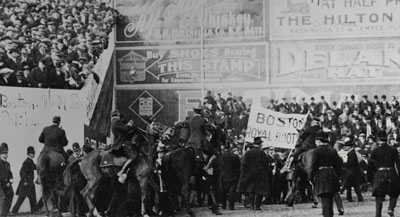
Police battle the Royal Rooters in front of the temporary bleachers in left field.
- After the game, the Rooters marched onto the field in celebration of the Red Sox defeat. Along the way, they enlisted other fans to join them in boycotting Game Eight.
- Some fans were also upset over reports that Stahl, with a 3-1 lead in games, was ordered by club President McAleer to send O'Brien to the hill to assure a Giant victory and extend the Series in order to increase revenue.
- Then to top it off, Wood's pitiful performance in the 1st inning of Game 6 raised the specter of a fix.
- The Red Sox had erected new stands down the LF line and in RCF to fully enclose Fenway Park for the first time. There were also temporary stands just in front of the LF wall. Any ball hit into those bleachers was a ground-rule double.
- The extra seating had been needed for every previous Series clash in Boston. But after the debacle of Game 7, only 17,034, including 2,000 Giant supporters, attended the final game as opposed to 32,694 the day before. The Red Sox still hold the dubious record of having the smallest crowd for a World Series ultimate game.
McAleer, who had champagne ready in the clubhouse when Game 7 started to celebrate the championship that didn't come, unsuccessfully lobbied the National Commission, the three-man committee in charge of baseball, to push back Game 8 to give more time to sell tickets.
His worst fears came to pass. The long lines for each of the first four games played at Fenway failed to materialize. Nary a soul was in line when the ticket office opened at 8 AM. Maybe they didn't get the message, wondered the Sox owner. But the fans knew the game would be played that day but were sending a message of their own to register their disgust at the performance of their club and its management the last two days. One Bostonian voiced a typical view. If he can treat the Rooters that way, then what kind of a chance do the rest of us have? The Rooters spend their own money to go to ... New York, and they get spit on? This McAleer is a fool, and I won't support any fool with my hard-earned money, no sir.
Word spread to New York after Game 7 that plenty of good seats would be available for the finale. So a number of New Yorkers booked train tickets to Boston, including gamblers and bookmakers who offered odds of
10-7 on the Giants.
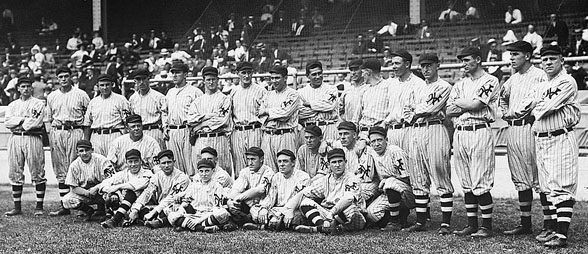 1912 New York Giants
|
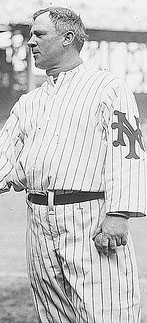
John McGraw
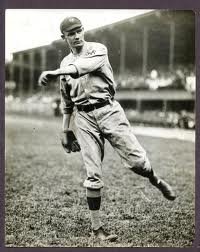
Rube Marquard
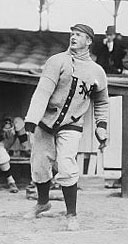
Christy Mathewson
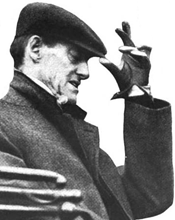
Giants owner John T. Brush, who was too ill to attend any Series games.
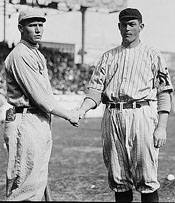
Joe Wood and Jeff Tesreau
before Game One
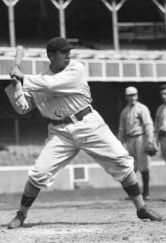
Chief Meyers
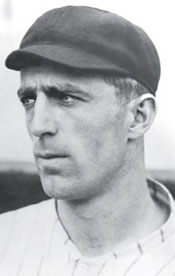
Fred Merkle
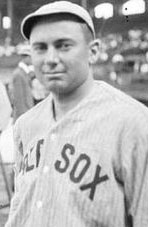
Duffy Lewis
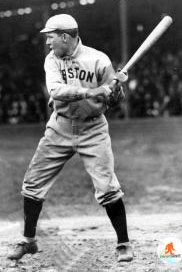
Tris Speaker
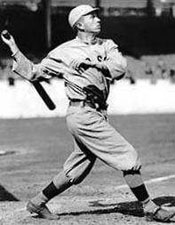
Harry Hooper
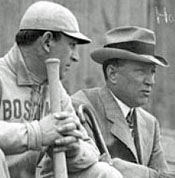
Manager Jake Stahl and owner James McAleer
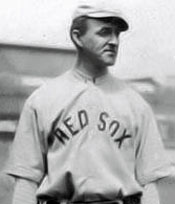
Buck O'Brien
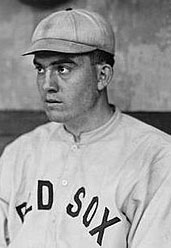
Ray Collins
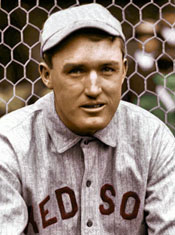
Bill Carrigan |
New York Giants Lineup
| Josh Devore |
RF |
| Larry Doyle |
2B |
| Fred Snodgrass |
CF |
| Red Murray |
LF |
| Fred Merkle |
1B |
| Buck Herzog |
3B |
| Chief Meyers |
C |
| Art Fletcher |
SS |
| Christy Mathewson |
P |
|
 |
 |
Boston Red Sox Lineup
| Harry Hooper |
RF |
| Steve Yerkes |
2B |
| Tris Speaker |
CF |
| Duffy Lewis |
LF |
| Larry Gardner |
3B |
| Jake Stahl |
1B |
| Heinie Wagner |
SS |
| Hick Cady |
C |
| Hugh Bedient |
P |
|
|
The chilly weather that came in right before Game 7 continued.
- AL President Ban Johnson, trying to salvage the World Series victory that looked like a sure thing after the Red Sox took a 3-1 lead, asked to speak to his league champs before the final game.
Boys, you have got to win this game. You have the ability, both mentally and physically, to beat the Giants. Go in and play for all you are worth and don't stop fighting until the last man has been retired. Upon you depends the future popularity of the American League. The Giants are going to make a desperate stand and will be hard to overcome, but if you play your best game you will be triumphant. Now buckle down to work and show the Boston baseball people how game you are!
Since Johnson was a member of the Commission that had provoked the ire of both teams when they ruled that the players would not share in the proceeds from Game 5 even though Game 2 had ended in a tie. So it was questionable how much effect his pregame plea had on the Red Sox. They continued to dress in silence, giving the impression of a beaten team.
Former Giant Heinie Wagner, who had been a team unifier all season, called his teammates together before they left for the field. Look, whatever's happened, we still have a shot to win the world's championship and to get our hands on that winner's share. We don't have to like each other. Hell, I'm past believing most of you guys can even tolerate each other and I have to tell you: I want to punch a couple of you in the jaw myself right now. But we got nine innings left in the season. No reason why we shouldn't get after it with everything we got. Is anyone with me? When no one answered right away, he shouted, Is anyone with me? First came one I am. Then some more replies. Yeah. Count me in. Let's beat their asses. Let's go for the big money.
- Before the game, Wood went into manager Stahl's office. Without apologizing for or explaining his performance the previous day, Smoky pronounced himself ready to pitch. The skipper told his 34-game winner he was going with Bedient but told Joe to stay ready.
- Although thousands of fans joined the Royal Rooters in boycotting the game, Bostonians still wanted their heroes to win. A crowd estimated at over 1500 gathered along Newspaper Row on Main Street - just blocks from half-empty Fenway Park - to receive an inning-by-inning report announced via a megaphone and posted on large bulletin boards. Others kept track of the doings at Fenway via telephone, setting a new record for Boston of nearly 2,000 calls in one day.
The throng at Newspaper Row was estimated to reach 50,000 by the time Game 8 ended.
- As they had done for all the games of the Series, huge numbers gathered in the Big Apple. An estimated 100,000 fans followed the game from electronic scoreboards posted outside the New York Times offices in Manhattan as well as in Herald Square a few blocks away, plus a lesser number along Newspaper Row and at Madison Square Garden.
The Newark Evening News set up a similar board
for fans in that city.
Three thousands miles across the continent, fans congregated outside the Los Angeles Times building to obtain telegraph reports of the action in distant Boston. The predominately male audience included a gray-haired woman with a perpetual smile. When asked whom she rooted for, she replied, I'm for the Giants. When a chauvinist guessed that she picked them for their uniforms, the lady set him straight. No, sir. I root for them because my son plays for them. He's the center fielder. His name is Fred Snodgrass.
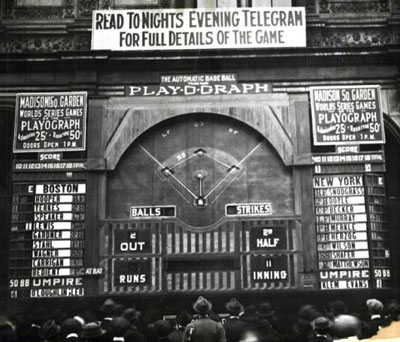
New Yorkers follow the action on the "Playograph."
- While the Red Sox may have lost confidence, the Giants suffered no such problem. They took the field laughing, whistling, and singing, showing the arrogance that irritated so many NL teams.
McGraw to reporters before the game: The Red Sox had us on the ropes (leading 3-to-1 after Game 5). But we survived, and now we're ready to take what is rightfully ours. We still haven't even played one game worth a damn, but that's OK. I think today will make up for the rest, and once we win today, nobody's going to care how we played in the other games.
- The Fenway field showed the wear and tear of a long season. Dry brown patches dotted the outfield grass, and the infield was anything but smooth, as if the grounds crew had taken the last few weeks off.
Mayor
John F. Fitzgerald, grandson of future President John Fitzgerald Kennedy, while a loyal member of the Royal Rooters, decided he needed to represent his constituents at the game.
- The two managers continued their game of warming up multiple hurlers to keep the opponent guessing about the starter - usually in vain. Stahl sent both Bedient and Wood to the bullpen to start throwing. McGraw saw that bet and doubled with four pitchers - Mathewson, Marquard, Jeff Tesreau, and Red Ames. Mugsy had to wonder about Stahl's choice, but no one was decoyed by the Giants' deception - bet 100% on Big Six.
The sun shone brightly, but a cold wind blew as AL umpire Silk O'Loughlin took his spot behind the plate.
1st inning
- Any fear that Bedient would start shakily were quickly dispelled. The pride of Faloner NY employed his "high inshoot" in combination with "a sweeping out drop" to bedevil the Giant lineup.
With the fans shaking the rattles they had been given, Josh Devore and Larry Doyle both grounded to SS.
Each time the Sox threw the ball around the infield after an out, 3B Larry Gardner brought the ball and words of encouragement to the mound.
Fred "Snow" Snodgrass walked, then stole 2B when SS Heinie Wagner dropped Hick Cady's throw.
Gardner moved in front of Wagner to snag Red Murray's bouncer and throw him out.
Snodgrass always stepped on 2nd base as he ran out to CF in the first inning of each game. For some reason, he didn't do that this game.
- To no one's surprise, McGraw chose his ace Christy Mathewson to pitch the final game.
"The Christian Gentleman" (also known as "Big Six") had pitched all ten innings of the deadlocked Game 2, in which he was a victim of five Giant errors that made all six Red Sox runs unearned. Christy pitched well in Game 5, yielding only five hits and two runs, but young Bedient threw even better to win 2-1.
Mathewson wrote in his syndicated column that
appeared in newspapers across the land the morning of Game 8: I'm tired. I think all of the fellows on both teams are tired. The baseball season is a long grind, and if you're lucky enough to play in the World Series, the way we are and the way Boston is, it can be exhausting. But we also know there's nothing to save ourselves for now. After today, we can relax. But we have a ballgame to play first.
Harry Hooper tried to bunt his way on but was thrown out.
Matty struck out Steve Yerkes on a "fadeaway" (screwball).
Tris
Speaker singled to RF and kept on running around 1B. He made it safely into 2B when Doyle dropped the throw that would have nailed him.
Speaker had rolled his ankle sliding into 1st during Game Two. He didn't miss an inning of the Series, and his condition had improved from barely able to run to close to normal.
With the crowd roaring, Christy struck out Lewis on three pitches.
2nd inning
- Merkle struck out.
Herzog flied to CF.
Meyers reached base when Gardner missed his grounder.
Fletcher lined a single over 2B sending Chief to 2B.
With Mathewson at bat, Cady tried to pick off Meyers who ran to 3rd where Gardner dropped Wagner's relay throw for his second error of the inning. Larry also injured his finger on the play but stayed in the game. Fletcher in the meantime took 2nd.
But Matty stranded both with a flyout to deep CF.
- Christy issued his first base on balls in 21 innings of the Series, Gardner receiving the free pass.
Stahl smacked a hard grounder to Doyle, who threw wide to 2nd trying for the forceout. But Fletcher stretched and caught the ball, jamming his foot on the bag just before Larry slid in.
The play loomed big when Wagner ripped a single to LF, the Bosox manager stopping at second.
With the Giant bullpen stirring, Cady popped out.
Bedient grounded out.
3rd inning
- The Sox rookie hurler finally cracked a little. He walked Devore on four pitches.
Doyle hit a swift grounder to Gardner that should have been a DP. But Larry bobbled the ball and got only the batter at 1B.
Snodgrass's roller to 1B sent Devore 90' closer to scoring.
Murray doubled to LCF off Speaker's fingertips to break the scoring ice.
Red was more than redeeming himself for his dreadful 0-for-21 in the 1913 Series against the Athletics.
The double was his 9th hit in 28 ABs against the Red Sox for his 4th RBI. He had also scored five runs.
But that was all for the Giants as Merkle grounded out.
- With some NY fans undoubtedly thinking, "OK, Matty, you've got your run," he breezed through the top three of the Boston order.
Hooper went down 4-3.
Yerkes bounced to the mound.
Speaker fanned.
Years later, Tris recalled what it was like facing Christy. You would watch from the bench, and you could barely contain yourself. You'd want to grab a bat and get up there and take your swings. And then you'd actually have a bat in your hands, and it was almost like he could read your mind. He knew exactly what he had to throw to make you look incredibly foolish. That's what great pitchers can do, even to very good hitters.
4th inning
- Herzog smacked his fourth double of the Series, a ground-rule job into the small opening between the stands.
The irony of the situation was that the Red Sox had gotten a triple on a ball into that same opening in Game 5, leading McGraw to argue successfully that the ground rule for the rest of the Series should award a double in that case. For once, the National Commission agreed with the proposal. So Buck, who easily made it to third, was waved back a base by Bill Klem. The Giants manager could hardly argue. All he could do was ask, Bill, are you sure the ball went in the hole? Saw it with my own eyes, John. It's a double.
The runner quickly reached 3B anyway but at the cost of an out on Meyers' sacrifice (5-3).
But Fletcher popped to 3B, and Matty flied to short RF.
The Giants had now stranded five in four frames.
Giants 1 Red Sox 0
- Lewis grounded to SS.
Gardner rapped a double to CF but was thrown out going for a triple, Snodgrass to Doyle to Herzog.
Stahl stuck out.
5th inning
- Devore beat out a hit off Bedient's shin.
Cady caught Josh trying to steal 2B (2-6).
Doyle smashed a fast ball high toward the new bleachers in RF. Convinced he had a homer, Larry trotted to 1st. But Hooper raced to the temporary fence ("twisting and turning" by one account), jumped, and snared the ball with his outstretched bare hand (or with both hands depending on the eyewitness) before disappearing into the crowd. Doyle continued his HR trot, thinking There's no way he caught that ball. Both Klem and Rigler, the 2B and 1B umpires, ran out to RF as Hooper popped up from the crowd, showing his outstretched glove with the baseball inside it. Rigler signaled Out! That brought McGraw racing from the 3B coaching box. There's no way you can tell for sure that he caught that ball! he yelled at Cy. For all you know, he picked it up off the ground after he fell in the stands! For all you know, a fan gave him the ball! The ump respectfully listened, then repeated, The batter is out!
Snodgrass singled but became the sixth New Yorker left on base when Murray fouled to Cady.
- Three Mathewson pitches, three flyouts, and side retired:
Wagner to LF
Cady to LF
Bedient to RF.
The Sox had changed their approach since Game 2 when they took pitches from Matty to wear him down for the late innings.
6th inning
- Merkle flew to RF.
Herzog hit a grounder to SS, and Stahl dug Wagner's low throw out of the dirt.
But Bedient still couldn't complete a 1-2-3 inning when he walked Meyers. However, Fletcher struck out - NY 7 LOB.
- The Red Sox staged a mini-rally consisting of Yerkes' single and Speaker's walk following Hooper's pop to Merkle.
But Lewis forced Tris at 2nd, Steve making 3B.
With Gardner at bat, Speaker bluffed a steal of 2nd. Meyers fired the ball back to Mathewson who relayed it to Herzog to catch Yerkes who had strayed too far off 3B.
7th inning
- The Giants again got a man on but couldn't get him in.
Matty opened with a line single over 2B.
Devore failed to sacrifice him to 2B, Bedient firing to Wagner for the force.
After Doyle popped out to SS, Josh registered his fourth steal of the Fall Classic.
But Snodgrass bounced out.
- Boston finally broke through.
The inning started innocently with Gardner flying to CF.
Stahl dropped a Texas Leaguer in LCF among three fielders, any of whom could have caught it.
With the Sox fans shaking their wooden rattlers, trying to shake the veteran hurler, Matty uncharacteristically walked Wagner.
Then the cagy hurler jammed Cady with a fastball that he popped to SS.
From 2nd base, Jake told Wood to remove his jacket and hurry to the bullpen to warm up. The skipper then ordered left-handed hitting OF Olaf Henriksen to bat for Bedient.
Called "Swede" despite being the only player in ML history born in Denmark, Henriksen batted only 56 times in 1912 but hit .321. He could have started for many teams but couldn't crack the Red Sox outfield of Lewis (who played in all 154 games), Speaker (153), and Hooper (147).
In Times Square, a ten-year-old boy, hearing the announcer call out the pinch hitter's name, asked Olaf Who-riksen?
Henriksen said afterward: Somehow, in that 7th inning, I got a hunch that I would be sent up as a pinch hitter. After Gardner had flied out to Devore, I pulled for Jake to get on for I felt if Stahl reached 1st, the chance I had been waiting for would come. I was certain - cocksure - that I could beat Matty.
Henriksen said afterward: Somehow, in that 7th inning, I got a hunch that I would be sent up as a pinch hitter. After Gardner had flied out to Devore, I pulled for Jake to get on for I felt if Stahl reached 1st, the chance I had been waiting for would come. I was certain - cocksure - that I could beat Matty.
When Swede stepped into the batter's box, Mathewson seemed to study him for a few moments.
Henriksen thought to himself, He's never heard of me! He has no idea what kind of pitches I like, which ones I avoid. He has no idea how to get me out! Swede decided to take the first pitch.
Matty threw a sweeping curve that dropped into the strike zone. Meyers yelled, Atta boy, Matty! Two more just like it!
Henriksen expected another curve, and he got it. He swung hard but didn't get even a piece of the ball. He's yours, Matty! He's yours! called Meyers.
Matty switched to his fastball, but two in a row missed just wide. Then he went back to the curve, the pitch diving from the waist straight down. Keeping his weight back, the batter readjusted his swing and met the ball squarely, sending it down the 3B line between the bag and Herzog's glove. Stahl scored the tying run easily and Wagner raced to 3B on the double.
Henriksen: It occurred to me for the first time that I had done something. So I stood on second base, and I was almost hypnotized by the racket of the crowd. I wondered, Is some of that meant for me?
Meanwhile, Mathewson stared at Swede, trying to figure out how he got his bat on a perfect pitch.
Hooper came up with a chance to put the Sox ahead, but Snodgrass made a nice running catch of his fly.
Giants 1 Red Sox 1
Ban Johnson couldn't take the tension any longer. He left his seat and started wandering around the park muttering to himself as he tried to burn off nervous energy.
8th inning
- Wood came in to pitch. Would it be the Smoky Joe who won Games 1 and 4 or the bush leaguer who got only three outs the day before? He started strong.
Murray rolled to Stahl unassisted.
Herzog lined a single over Yerkes' head, Buck's 12th hit of the Series.
But Meyers' roller to Yerkes stranded the Giants' 9th runner.
- Matty's sinker caused three straight groundouts.
Yerkes bounced the ball off the P to Herzog who threw out the batter.
Speaker rolled to Doyle.
Lewis went out 6-3.
9th inning
Unlike in Game 2, which was halted by darkness after the 10th, about an hour of sunshine remained for extra baseball. The 10th became one of the most topsy-turvy final innings in World Series history behind only the last frame of the 1960 Classic.
Top of 10th
- The leadoff hitter was Fred Snodgrass.
Snodgrass caught McGraw's eye when he held spring training in California in 1907. Fred was the catcher for the team at St. Vincent's College where the Giants were training. He signed a contract and made the team as a third-string C. McGraw spent several seasons tring to find a place for him to play before settling on CF in 1910. Fred responded by hitting .321 and stealing 51 bases that season. While he didn't come close to those numbers since then, Snodgrass earned a reputation as one of the more reliable CFs in the league. Unfortunately, his bouts of selfishness and standoffishness and the fact that he was "McGraw's boy" didn't endear him to his teammates.
Wood fired a fast one down the middle that Snodgrass took for strike one. Then he swung at the next blazer and bounced back to the mound.
As Fred returned to the dugout, he experienced pain as he tried to straighten out his fingers. Only then did he realize how tightly he had been gripping the bat.
In Los Angeles, Adie Snodgrass saw her son's name listed as the leadoff hitter and heard the announcer call out, Ground ball to the pitcher. One away.
Murray delivered a ground rule double into the crowd in LF, his fourth twobagger of the series. As he reached 2nd standing up, Red pounded his hands together, the clap audible throughout the quiet ballpark.
Merkle whistled a sinking liner into CF. The usually reliable Speaker foolishly tried to make a diving catch instead of taking the ball on the hop. The ball rolled underneath him, allowing Murray to score the go-ahead run without a throw and letting Fred take 2B.
Still haunted by his bonehead play at the end of the '08 season, the Giants first-sacker must have felt that smacking the winning hit in the World Series would erase that stain.
The Boston Journal writer reported: Hundreds of fans tore up their scorecards, jammed their hats down over their heads, and disconsolately left the grounds for Mathewson was pitching a game that was baffling the bats of the Red Sox.
On Seventh Avenue in New York, many threw their hats and shredded newspapers in the air in anticipation of victory.
Speaker in CF might have wondered if he would go down as a Series goat for his poor judgment on Merkle's liner.
- Smoky Joe bore down and struck out Herzog on three pitches.
Afterward, Wood called the three deliveries my hardest three pitches of the season. Herzog said, I never saw 'em. I just heard 'em.
- Meyers lined a shot up the middle. Wood instinctively reached for the ball with his pitching hand. The ball hit his thumb but dropped nearby. He threw Chief out at 1B to make Merkle the 11th Giant left on base. If the game were to go another inning, Joe's continuation on the mound was in doubt.
Wood showed Stahl his pitching hand when they reached the dugout. The skipper took one look at the disfigured thumb and said, That son of a bitch is broken.
Bottom of 10th
- Today's manager would bring in his closer to seal the victory. But the thought of a reliever never crossed McGraw's mind in 1912 as he had complete faith in Big Six, his money pitcher since 1901.
Matty was heading to the mound as McGraw came in from the 3rd base coaching box. The manager put his hand on his ace's shoulder, but neither man needed to say anything.
Doyle, the Giants captain who never forgot Mathewson shaking his nervous hand when he arrived in New York five years earlier, jogged in front of Christy and shook his fist in anticipation of victory. Matty told the second sacker, I'll float my old arm out there right after the ball if I have to in this inning. I'll win the game.
Meyers headed to the mound to go over the signals with his pitcher. Chief pointed to the Boston dugout where trainers were examining Wood's hand. I got him right square on the hand, the backstop told his hurler. No way he can pitch again, much less hit here. Christy replied with uncharacteristic boldness, Let's make that a moot point.
- Smoky Joe was one of the best hitting pitchers of the day with a .290 BA in 1912. But his thumb made batting hopeless. So Stahl chose righthand batting Clyde Engle to hit for Wood.
The .234 hitter took a strike that popped into the catcher's so hard that the sound echoed around the quiet park.
When Matty fired another rising fastball, Engle swung and lofted a high fly to LCF as the crowd groaned. Clyde fired his bat down in disgust, and Doyle yelled That's one of 'em! loud enough to be heard in the press box. The other voice was Snodgrass's yelling I got it! I got it! as he called off LF Murray, who some say had the easier play. Obeying one of McGraw's fundamental rules, If the CF believed he could catch the ball, he caught the ball, Red took a knee to stay out of Fred's way. Some say Murray yelled at Snodgrass to flip him the ball after catching it so he could be part of one of the final outs of the World Series. Be that as it may, Fred settled under the ball and dropped it. Hustling all the way, Engel ended up on 2nd.
Normally so cool, Mathewson swung his gloved hand in a small gesture of frustration (similar to Joe DiMaggio kicking the dirt in Game Six of the 1947 Series when Al Gionfriddo robbed him of a HR?).
Fred later said, I dropped the darned thing. It was so high that Engle was sitting on 2B before I could get it back to the infield.
Hugh Fullerton of the New York Times thought that Fred tried to throw the ball before he had full control of it. His article may be the origin of the tale that Murray asked Snodgrass to flip him the ball after he caught it.
In New York, fans watching the big boards were puzzled when Engel's name was displayed at 2nd base. One fan called out, A fellow named Engel hit a double off Matty? That can't be. When E8 was posted on the board, another fan yelled, Surely it had to be a hard play. They are notoriously difficult scorers in Boston, you know.
In California, the board simply showed Engel on 2nd without explaining how he got there. So Adie Snodgrass wondered if the Great Mathewson was overrated if he let a substitute get a hit off him.
- If Fred was moping over his embarrassing blunder, he didn't show it. With the crowd in a frenzy, Hooper twice tried to sacrifice but didn't succeed in laying one down in fair territory. So with two strikes, he smashed a ball to LCF that should have tied the game. So the Boston RF, who had robbed Doyle of a homer in the 5th, was now denied himself on a diving catch by Snodgrass. As Harry remembered years later, Ninety-nine times out of a hundred no outfielder could possibly come close to that ball. But ... Snodgrass ran like the wind and dang if he didn't catch it. I think he outran the ball. Robbed me of a sure triple. Engle ran to 3rd after the catch. Mathewson again waved his glove at Snodgrass, this time to acknowledge a spectacular play.
Participants in the 1912 World Series were still talking about the Snodgrass catch years later.
John McGraw in 1931: It was so impossible, it was hard to describe.
Tris Speaker in 1949: I saw thousands of games, and I never, ever saw a catch like that before or after. It was a like a magic trick.
- The already-strange inning got even weirder. First, Matty tried to work the corners to Yerkes but walked the .252 hitter on a 3-1 count.
- Next up was Speaker, eager to atone for his misplay in the top of the inning. He had gone 4-for-11 against Mathewson in the Series for a swell .363 average.
In a stroke of irony, Tris had tried out for McGraw in 1908 after suffering a severe injury while playing college football at Fort Worth Polytechnic Institute. Doctors actually wanted to amputate his left arm, but Speaker wouldn't consent, and the limb healed on its own. McGraw said he had no place for me, Tris recalled years later. I did everything I could, but I couldn't get him to change his mind.
Needing a strikeout or popup to keep the tying run at 3rd, Christy got the latter when Speaker swung at the first pitch, a curve that broke inside, and lofted theball between 1B and home plate in foul territory. Accounts vary as to what happened next. Some say Merkle, perhaps daydreaming of his RBI hit in the top of the inning, froze and didn't move quickly toward the ball. Others say Matty yelled for Chief to take the ball. What is clear is that the C couldn't get to the ball, which dropped foul closer to 1B than to home plate to give Tris new life as some in the crowd laughed before a hearty cheer broke out. Mathewson had to put aside any thoughts of self-pity because he should have retired the Sox 1-2-3 to preserve the victory. Speaker yelled, Well, Matty, you just called for the wrong man. Now it's gonna cost you the ball game! Tris backed up his words by lashing the next pitch, a hanging curve, over Doyle's head on one big hop to Devore in RF. Engle scored the tying run, and Yerkes scampered to 3rd. Speaker took second on the unwise throw-in over the cutoff man's head.
- McGraw ordered an intentional walk to Lewis to set up a forceout at home.
- That brought Gardner to the plate, he of the two errors in the 2nd inning, sore finger, and 5-for-27 batting mark (.185) for the Series. With the infield drawn in, Gardner worked the count to 3-1, then smashed Matty's 27th pitch of the inning and 124th of the game deep into RF. As soon as the ball left the bat, Matty threw up his hands and left the mound. Yerkes tagged up and Engel, now coaching 3rd, got ready to send him home. Devore caught it almost at the fence, but his desperation peg home had no chance. Stahl, waiting on deck, threw up his hands to signal Yerkes that he didn't have to slide. Meyers turned away without trying for the ball as Steve crossed the plate with the run that gave the Red Sox their second World Championship in as many tries.
Across the continent in Los Angeles, someone asked, Who committed the error on Engle? right after the final score was posted. The announcer checked his reports and yelled back, The centerfielder. Snodgrass. At that moment, one of the spectators fainted. Adie Snodgrass finally came to on her way to the hospital and whispered, My poor boy.
New York Globe writer Sid Mercer, sitting in the Fenway Park press box with tears streaming down his face, dictated his account of the game to a telegraph operator.
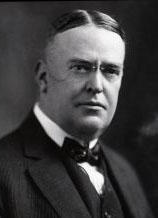
Ban Johnson
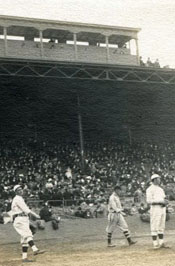
Joe Wood (L) warms up before Game 4.
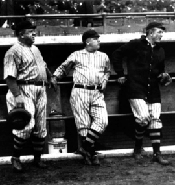
Wilbert Robinson, John McGraw, and Christy Mathewson during 1912 World Series
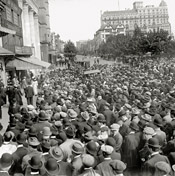
Following the World Series in Washington D.C.
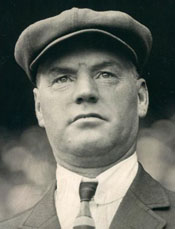
Silk O'Loughlin
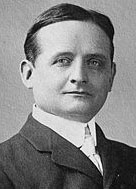
Boston Mayor John F. Fitzgerald
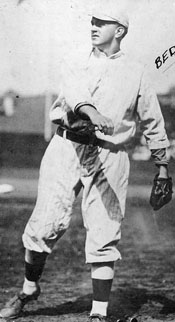
Hugh Bedient
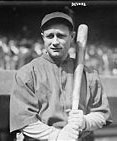
Josh Devore
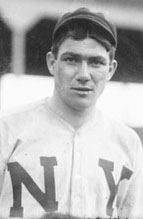
Larry Doyle
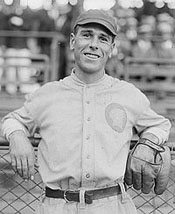
Fred Snodgrass
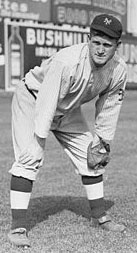
Red Murray
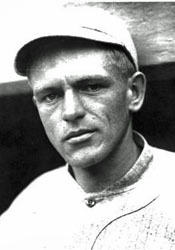
Larry Gardner
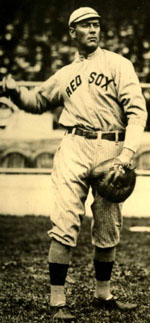
Hick Cady
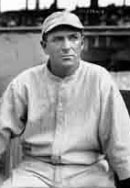
Heinie Wagner
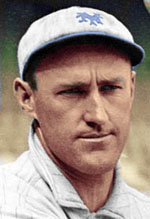
Art Fletcher
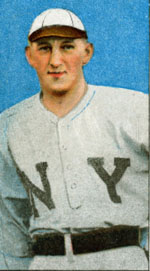
Buck Herzog
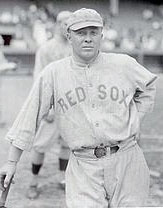
Olaf Henriksen
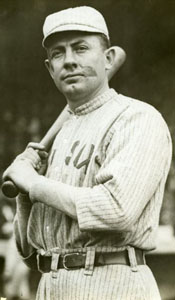
Steve Yerkes
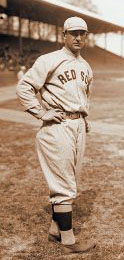
Jake Stahl

Chief Meyers
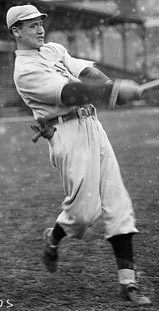
Joe Wood, a good-hitting P
10th Inning Actors
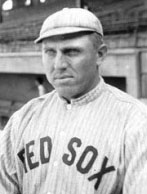
Clyde Engle
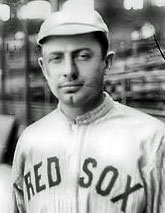
Steve Yerkes
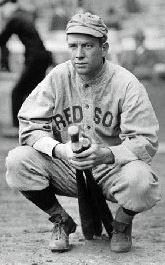
Tris Speaker
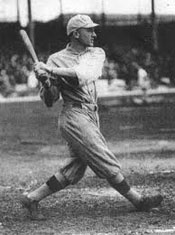
Larry Gardner
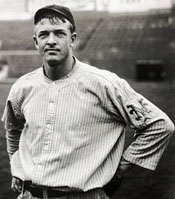
Christy Mathewson
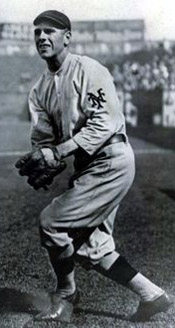
Adie Snodgrass's son
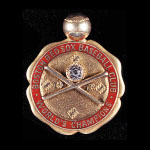
Championship medal
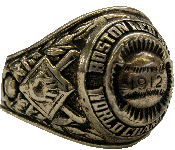
Championship ring
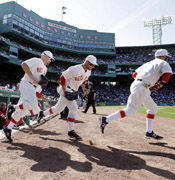
2012 Red Sox take the field in throwback uniforms to celebrate the 100th anniversary of Fenway Park
|
|
The crowds in Fenway Park and a few blocks away at Newspaper Row erupted in a delirium of joy unlike anything staid Boston had ever seen.
- Men threw their hats in the air and cheered until they could cheer no more. Women cried.
As they heard the news wherever they were scattered, the Royal Rooters
instinctively headed for McGreevy's saloon where they celebrated into the wee hours of the morning.
- The field became a living mass of humanity that gathered about the Boston bench applauding their heroes and even directing a few hurrahs to Snodgrass. Three mounted officers helped clear a path for the Red Sox to reach their dugout and head to the safety of the locker room. Some of the heroes of the 10th inning rally were detained by women fans who planted kisses on them.
Later, when Hooper left the park, the Boston Journal reported that a real charming young lady in dark clothing rushed to him, and before the young Californian had time to do anything she had planted a healthy young kiss on his brow. In another instant Harry had been lifted to the shoulders of the admiring gathering and was being led through the crowd that cheered and shouted at the very top of their voices.
- Mathewson buried himself in his great coat and walked almost dejectedly from the field. Scores of fans followed the P, patting him on the back to congratulate him for his fine work in the box. Ring Lardner wrote in his article for the Chicago Tribune that Matty left the field with tears streaming from his eyes ... a man who would have proven his clear title to the best reposed in him if his mates had stood by him in the supreme test. In the press box, Steve Mercer of the New York Globe wept unashamedly as he worked on his article for the game. McGraw's good friend and chief assistant, Wilbert Robinson, sat dejectedly in the dugout a good half an hour.
- McGraw himself threw his arms around his tearful pitcher, then shook his hand. Matty had lost two games but compiled an ERA of 0.94 in 28 2/3 innings. I never seen a gamer pitcher than you, son. You're the greatest boxman that the world's ever seen. I wish I had ten more just like you. It's a bad day for the Giants, but it's a wondrous one for you. Then Mugsy elbowed his way through the throng to the Red Sox dugout to congratulate his winning counterpart. As John reached his destination, a Boston fan ran into him from behind, almost knocking him into the pit. McGraw turned and punched the man. After a few tense seconds, the general jubilation defused the situation. Stahl noticed that John's hand was bleeding when he shook it in the Red Sox clubhouse. The Giant Boss reported his conversation with Stahl like this: I can't say that I'm glad, Jake, but one of the teams had to win; it was the Red Sox, and congratulations are in order.
Stahl replied, Thank you, Mr. McGraw, thereby avoiding a chance to rub it in by calling him "Mugsy."
When Mathewson finally emerged from the clubhouse, some Sox fans shook hands with him and wished him well as he walked to a taxi.
- Victory brought reconciliation to the Red Sox. Wood went to O'Brien, shook his hand, and asked forgiveness for lashing out at him after Game 6.
- Some Boston fans chanted Snodgrass's name as he left the field. He tried to avoid talking to anyone.
According to teammate Tesreau, Snodgrass acted as if he was a criminal. Riding in the taxi to the hotel with Jeff and Devore, Fred began to cry, moaning Boys, I lost the championship for you. In telling the story, Tesreau gave the CF no sympathy. He really had (lost the game), and there was no use trying to deny it. Ten chances to one he will read some similar comments in the papers in the morning if he cares to read them. So we just naturally kept quiet, and if silence means assent, Snodgrass knew that we admitted he had lost it. Two or three times Josh started to break out and tell him so, because he was terribly sore over it, but he took one look at Snodgrass and quit. He was the most dejected looking person I ever saw.
- On Seventh Avenue in New York, dejected Giant rooters paid off bets and departed while the Red Sox contingent remained around the scoreboard to execute sidewalk dances and raise more din for a good hour after the game.
Aftermath
- The New York Times the next day headlined its article thus:
SOX CHAMPIONS ON MUFFED FLY
Snodgrass Drops Easy Ball, Costing Teammates $29,514
Fullerton started his report this way:
Write in the pages of world's series baseball history the name of Snodgrass. Write it large and black. Not as a hero; truly not. Put him rather with Merkle, who was in such a hurry that he gave away a National League championship. Snodgrass was in such a hurry that he gave away a world championship. It was because of Snodgrass's generous muff of an easy fly in the tenth inning that the decisive game in the world's series went to the Boston Red Sox ...
Hugh went on to detail all the other mistakes the Giants made, including the missed foul pop that should have retired Speaker in the bottom of the 10th. He made a brief mention of Snodgrass's running catch on the next batter, not concentrating on the brilliance of the catch but rather using the hard hit ball as evidence that Fred's misplay discouraged Matty.
He has lost none of his courage and determination, but it can be seen as he faces Hooper that there is just a bit of uncertainty in his bearing. Proof comes that he has lost some of his cunning, for Hooper hits the ball so hard that Snodgrass has to sprint and reach to pull down the liner.
But someone reading the opening of the article would think poor Fred was the scapegoat of the series, a tag that stuck with him the rest of his life.
In a later article, Fullerton vented his spleen on Merkle for not catching Speaker's foul pop.
Anyone could have caught it. I could have jumped out of the press box and caught it behind my back. But Merkle quit. Yes, Merkle quit cold. He didn't start for the ball. He seemed to be suffering from financial paralysis. Perhaps he was calculating the difference between the winner's and loser's end [$4,024 to $2,366 per man]. He didn't start. Mathewson saw the ball going down. Meyers saw it would fall safe and they ran toward it, too late, and the ball dented the turf a few feet from first.
Wood and Hooper, who viewed the play from the proximity of the 1B dugout, claimed that Mathewson called for Meyers to make the catch. Wood: The first baseman ... had the best shot at it. But instead of calling for Merkle to take it, Mathewson came down off the mound calling for Chief Meyers ... I'll never know why. ... The ball dropped. ... We couldn't believe it. Neither could Mathewson. You never saw a man as mad as he was when that ball hit the ground. But the way we saw it, it was his own fault. ... That's what we always felt won the Series for us. The write-ups in the papers never stressed that as much as they did Snodgrass dropping the ball in CF.
In later years, Mathewson claimed he called Merkle, not Meyers, to take the popup. Chief, interviewed by Lawrence Ritter for The Glory of Their Times, didn't mention hearing any Giant call for the ball but suggested that the Red Sox may have contributed to the confusion by calling off Merkle.
- In his own article in the New York Times the day after the game, McGraw refused to blame Snodgrass for the defeat.
I am not blaming anybody. All the boys did their best, and worked their hardest. Errors and tough luck are everyday affairs in baseball, and we merely regard them as part of the game. Of course, I am sorry that we lost, but I feel sorriest for Mathewson. He pitched one of his great games. ...
Snodgrass had a little hard luck today, but in this game a man has an opportunity to make a misplay on every ball that is hit in his direction, and it must be remembered that Snodgrass has done some nice fielding for us during the series. He was a little overanxious today, but that was all. I was a bit disappointed that a couple of fly balls hit the ground without any play being made on them, which afterward turned into the runs that beat us.
- In the coming days, McGraw reacted angrily to stories that he had berated Snodgrass in the clubhouse and threatened to release him. Snodgrass didn't lose that game. The game was lost when Speaker's foul wasn't caught. I'll tell you what I think of Snodgrass: I think he's the best outfielder I have and one of the best in baseball. I'm going to give him a better contract next year than he's ever had! (And he did just as he had for Merkle after his bonehead baserunning cost the Giants the 1908 pennant.)
- In later years, Mathewson said, I don't blame Snodgrass for that (the defeat), and I feel downright sorry for him. I'd much rather be in my place than his.
- Two years later, a reporter working on an article about baseball players' superstitions asked Snodgrass about his failure to touch 2B as he ran to his position in the 1st inning of Game 8 of the 1912 World Series. I remembered that I didn't. My oversight worried me, and I thought to myself, "I'll bet I have some bad luck for not touching 2nd." I certainly did!
Harry Hooper saw Snodgrass decades later and complimented him on the great catch that momentarily saved the 1912 World Series for New York. Well, thank you, Snodgrass replied. Nobody ever mentions that catch to me. All they talk about is the muff.
Mayor Fitzgerald scheduled "an informatl demonstration" for the Red Sox the next day at 12:30 at Fanueil Hall, a Boston landmark since the days of the Revolution.
- The celebration started with a parade from Fenway Park at noon.
- The crowd was estimated as several hundred thousand.
- Honey Fitz gave a laudatory speech before presenting each player with a key to the city.
Fitz took the opportunity to get in a dig at the National Commission. I also want to say that the players are entitled to their share of the fifth game which is morally theirs. At that, the crowd went wild, as did the players.
- When Stahl addressed the crowd, he tried to help McAleer repair some damage. I want to thank the Rooters for helping us, as they did. You all know what good they did for us.
- McAleer publicly apologized to the Royal Rooters for not securing their seats for Game 7 and reiterated that the mistake was unintentional.
Each member of the winning Red Sox earned $4,025 while each Giant took home $2,566. Both amounts ranked as the highest yet paid out for any World Series.
Snodgrass, who was 24 in 1912, played four more years for the Giants and Boston Braves before retiring to his home state of California with a .275 lifetime BA. He had a successful career as a businessman and rancher and was elected mayor of Oxnard CA. But when he died in 1974, the New York Times obituary read: FRED SNODGRASS, 86, DEAD; BALLPLAYER MUFFED 1912 FLY.
Final word: Over a century later, the Red Sox have never again won the deciding game of a World Series that was tied three-games-to-three.
1912 World Champion Boston Red Sox
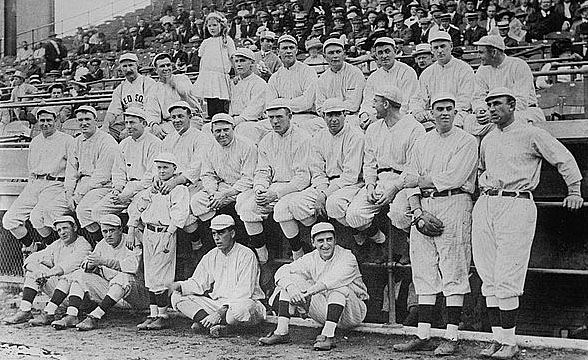 1912 Boston Red Sox
References: The World Series, David S. Neft & Richard M. Cohen (1990)
The Seventh Game, Barry Levenson (2004)
Red Sox Century: The Definitive History of Baseball's Most Storied Franchise, Glenn Stout and Richard A. Johnson (2004)
The Old Ball Game: How John McGraw, Christy Mathewson, and the New York Giants Created Modern Baseball,
Frank Deford (2005)
The First Fall Classic: The Red Sox, the Giants, and the Cast of Players, Pugs, and Politicos Who Reinvented the World Series in 1912, Mike Vaccaro (2006)p
|
|
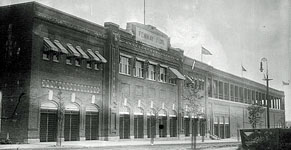



 1912
1912 












